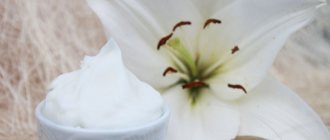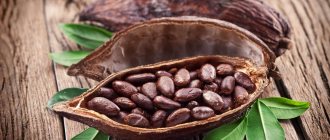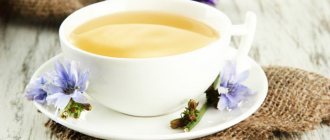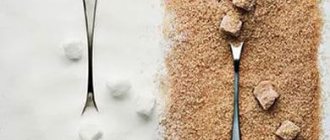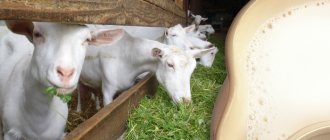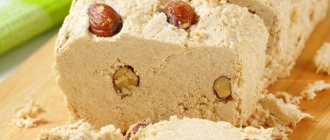Is tea good for nursing mothers?
The main question that arises for young women after childbirth is: “Can a nursing mother have tea (see also: can nursing mothers eat or drink ginger?)?” Dr. Komarovsky claims that purified drinking water is ideal for mothers to replenish fluid deficiency, but not all women are able to drink only water during the day. Experts in natural feeding say: for lactation to be successful, a woman should drink about 2.5 liters of liquid per day. You can diversify your drinking diet by drinking tea; some varieties will be beneficial for the health of mother and child. The basic rule is to drink tea drinks in small portions and carefully, having first studied the properties and composition.
READ ALSO: What tea is allowed for nursing mothers?
Tea composition and beneficial properties
Tea leaves contain tannins, catechins and polyphenols - these are tannins that have a healing effect. In medicine, these elements are often used as an antiseptic and hemostatic agent. In addition, the tea drink contains vitamin C, which strengthens the immune system and protects the body from viruses, and vitamin K, which improves blood clotting. Green tea contains five times more vitamins that are beneficial to the body, which is why green tea is preferable during breastfeeding. Speaking about the benefits of drinking tea, we should not forget about pleasant moments. Your favorite drink improves your body tone and improves your mood. If during pregnancy a woman regularly had tea parties without negative consequences, then she should not give them up during breastfeeding.
READ ALSO: how to drink thyme while breastfeeding?
Additional beneficial qualities of tea leaves:
- have an antioxidant effect (strengthen the immune system, remove toxins);
- have antiseptic properties and strengthen gums;
- stimulate thinking processes and strengthen the nervous system;
- have a mild diuretic effect, improve metabolism, accelerate weight loss;
- stimulate digestive processes, reduce blood pressure.
When should a nursing mother not drink green tea?
Like any other drink, it requires adherence to brewing technology. So, for cooking, a porcelain or glass teapot is prepared, into which fresh or dried raw materials are placed. The leaves are filled with water no hotter than 80 degrees to preserve all the benefits of cat grass. On average, a spoonful of beekeeper and regular tea is poured per liter of water.
Beneficial features
- no more than once a week;
- the infusion should not be strong;
- if the baby is not allergic to menthol.
If you do not want to reduce breast milk, use a few fresh leaves or 1 tsp to brew tea. dry mint. Place the mint in a teapot and pour in 500 ml of boiling water. Leave for 10 minutes, then drink. You are allowed to drink no more than 1-2 cups of infusion per day.
If the mother plans to complete breastfeeding or reduce the volume of milk produced, prepare and take tea according to the following scheme:
- Place 1 tablespoon each of dried mint and sage into the teapot.
- Pour in 1 liter of hot water.
- Leave for 20–30 minutes.
- Drink throughout the day, period of use - 3-5 days.
- Take a break of 1-2 days.
Repeat the course of taking the infusion if necessary.
You should drink this type of tea with caution if you suspect a food allergy in your baby - some pediatricians may advise you to give up green tea altogether for the entire period of breastfeeding.
Cheap and suspicious packaged teas with unnatural flavors are strictly prohibited during lactation - inside such a product there are raw materials of dubious quality, which, moreover, may well cause a negative reaction in a newborn (rash, diathesis or stomach upset).
Green tea while breastfeeding can provoke similar problems in a young mother, because after childbirth, the work of many systems and organs still remains in a special mode and you may react to well-known products differently than before.
Caffeine
When it comes to the question of whether a tea drink is beneficial or harmful for nursing women, many young mothers worry about the effect of caffeine on the baby’s condition. However, caffeine is not as dangerous as they say. A mug of tea contains 10 times less caffeine than the same mug of freshly brewed coffee. However, the effect of tea caffeine lasts much longer. If you drink sweet tea in moderate doses, caffeine can normalize metabolic processes in the body, relieve accumulated fatigue, improve digestion and increase performance.
READ ALSO: Is it possible to drink decaffeinated coffee while breastfeeding? Despite the proven positive effect of consuming theine, doctors strongly do not recommend having frequent tea parties in the first weeks after childbirth, since the baby’s body is still very sensitive to all substances that come through mother’s milk.
Table - How much caffeine is contained in a tea drink:
| Type of tea drink | Caffeine per 100 g. |
| Baykhovy | 40 |
| Green | 20 |
| Red (from pink petals, hibiscus) | 30 |
| White | 5 |
| Herbal | Does not contain |
| Fruit | Does not contain |
| With bergamot | 20 |
| With ginger | 10 |
The most tonic of all types of tea is black, so it is recommended to drink it only in the first half of the day, without brewing it strongly. Green tea contains less caffeine and can be consumed throughout the day until 8 pm. At night, it is better to drink a mug of white infusion - this variety contains virtually no caffeine. You need to be very careful with fruit and herbal types of tea drink in the first months after childbirth. Despite the complete absence of caffeine, these infusions can cause severe allergic reactions.
Benefits of lemon balm tea during breastfeeding
Melissa is an incredibly aromatic plant that is widely used in cooking and in the preparation of hot drinks. In appearance, these green leaves resemble mint, but only have a more original taste and smell - they are distinguished by citrus notes, which mint does not have.
Melissa gives tea a rich, refreshing taste, and therefore such healthy leaves are often used instead of a lemon wedge.
If you really like tea with lemon, but you are not recommended to consume citrus fruits while breastfeeding due to the high risk of allergies in your baby, then you can simply add a couple of leaves of dried or fresh lemon balm to the teapot - the effect will be about the same as from lemon.
Melissa has long been known as a folk sedative - this plant has pronounced sedative properties, so such decoctions are often prescribed by therapists as a natural and safe cure for insomnia and nervous tension.
Melissa and teas made from it are especially useful for young mothers during breastfeeding who are experiencing postpartum depression, have restless sleep, are often worried and nervous, or are constantly in a state of stress.
The benefits of lemon balm teas for nursing mothers
- The mild calming effect of this fragrant herb will be especially useful during breastfeeding, because at this time you simply cannot take many relaxing drugs. To experience the benefits of this miracle herb, drink two cups of freshly brewed drink per day: one serving in the morning when you wake up, and one just before bed.
- As you know, negative experiences, nervous states and emotional upheavals always affect the amount of breast milk - if a nursing woman is often nervous, then problems with lactation will begin, and she will have to resort to the help of drugs to increase milk production. However, this can be avoided by drinking lemon balm tea during the breastfeeding period.
- For some young mothers, the first months after childbirth are the most difficult, and therefore night sleep may deteriorate due to stress and endless bustle, which can also have a negative impact on the amount of breast milk. Melissa copes well with both nighttime insomnia and the inability to fall asleep quickly and easily, so it can be safely used for these purposes.
- Like any warm drink, herbal teas have a good effect on the mechanism of breast milk production - lemon balm decoctions will help increase the amount of milk so that the baby always has enough of it in abundance.
- When following a strict diet, few nursing mothers can afford something tasty, so aromatic herbal tea can be an excellent way out, especially if your pediatrician does not advise you to drink green or black teas because of their tonic and invigorating effect.
- By the way, lemon balm has a completely opposite effect, as we said above, and therefore such decoctions also have a good effect on restless babies - penetrating into breast milk, beneficial substances gently calm the baby’s psyche overloaded with new impressions, making the newborn calmer and improving his sleep.
Vitamins and microelements contained in lemon balm teas
As everyone knows, a nursing mother needs much larger doses of vitamins and nutrients, because some of them leave the female body to go into breast milk and allow the baby to develop and grow properly.
Melissa is a medicinal fragrant herb that will be an excellent vitamin supplement to your diet. So, these green leaves with the aroma of lemon contain a lot of vitamin B1 and B2, as well as vitamin C and even Beta-carotene, which is beneficial for the immune system.
When consumed regularly, lemon balm will improve your health, help fight seasonal viruses and colds, and this aromatic plant is widely known as a natural remedy for allergies.
In addition, during breastfeeding, lemon balm teas will support a woman’s body, preserving the beauty of the skin - lemon balm contains many natural antioxidants that prevent the aging process and fight for female beauty, and also protect our body from many serious diseases.
Melissa is also rich in micro- and macroelements. This tea contains calcium, iron, magnesium, as well as zinc, potassium, manganese and many other useful elements. The unique chemical composition makes lemon balm incredibly useful for nursing women and provides the body with an additional source of vitamins and substances essential for good health.
Types of tea
Green tea
Green tea is the most popular variety among women during breastfeeding. It is included in the diet for the purpose of losing weight and restoring the body after intense training.
Green tea, compared to black tea, contains the least amount of theine (an analogue of caffeine); this variety is most recommended for women. Green tea is beneficial for a nursing mother if consumed in small quantities. The recommended dose is no more than two cups daily.
How to organize “green” tea parties correctly:
- no need to drink the drink on an empty stomach or at night;
- It is better to brew the leaves in a clay pot - this way the taste of the drink is revealed more fully;
- there is no need to pour boiling water over the leaves, the water temperature should not exceed 70-80 degrees;
- the brewing speed depends on the variety and can vary from 20 seconds to 15 minutes;
- the norm of tea drinking per day without harm to the body is no more than two;
- if mom doesn’t eat sugar, you can sweeten green tea with fructose;
- for tea drinking, it is better to take small mugs of 150 ml, drink 15-20 minutes before feeding the baby;
- Do not add milk or cream to the mug - this will reduce the risk of colic.
READ ALSO: Can a nursing mother drink mint tea?
Herbal tea
Herbal tea drink combines the natural benefits and natural taste of herbs, fruit trees and medicinal plants. Herbal infusions have long been famous for their healing and soothing properties. For medical purposes, infusions are used to treat inflammatory diseases and antibacterial therapy. Some herbs can cause allergies, so it is not recommended to use herbs during pregnancy and lactation, when a woman’s hormonal levels are disrupted.
Herbs can provoke diathesis, disruption of the baby’s fragile heart, kidneys and stomach. Drinks made from brewed raspberry, cherry, and blackberry leaves with the addition of oregano are considered the least dangerous during this period (more details in the article: How do raspberries work during breastfeeding?). Before you start taking herbal tea, it is better to consult your doctor.
Melissa
In culinary recipes, lemon balm is used as a seasoning for meat dishes and salads. Fresh lemon balm leaves are great for decorating desserts and ice cream. Most often, lemon balm decoction is used as the main drink during lactation. For the decoction, use hot water at a temperature of 90 degrees. Boiling water will destroy all the beneficial trace elements of the grass. Tea leaves are brewed for 7-10 minutes. To improve the taste, it is recommended to add lemon or rose hips to the drink. You should not take lemon balm if a woman has allergies, individual intolerance to the plant, or diseases associated with low blood pressure.
Bergamot
Bergamot is a representative of citrus plants and contains essential oils. Drinking tea with bergamot while breastfeeding is not recommended - it can provoke allergic reactions in mother and baby. After the child turns six months old, an infusion with bergamot is recommended for use in small portions 3-4 times a week.
Ginger
Ginger root is used to cleanse the body, prevent colds and viral diseases. For medical purposes, a tea drink with ginger is used to eliminate iron deficiency. During lactation, ginger can become a strong allergen, so it should be used with great caution, but not earlier than three months after the birth of the baby.
You need to start drinking ginger tea in small doses. After the first use, you need to take a break of 1-2 days to monitor the child’s reaction. If you have redness, pimples or food reactions, it is better to stop drinking tea for 2-3 weeks.
If no reactions are detected, it is possible to gradually increase the dose of the drink from a quarter of a mug to the usual norm. Lemon, linden, oregano can be good additions to ginger infusion - they will make the drink more healthy and tasty.
Black tea
Of all the tea drinks, black tea is the least beneficial for breastfeeding due to the content of theine, a substance similar in properties to caffeine. Pediatricians and breastfeeding specialists say that drinking black tea is one of the causes of colic and intestinal problems in babies. If it is impossible to refuse tea drinking in the first months after childbirth, you should adhere to the following rules:
READ ALSO: Can a nursing mother drink tea with lemon while breastfeeding?
- the permissible amount of tea per day is one mug in the morning;
- Tea leaves should be brewed with clean, settled water;
- avoid additives and artificial flavors: jasmine, bergamot, lemon;
- It is better to drink weakly brewed, “pale” tea;
- You should not drink tea on an empty stomach, and it is not advisable to drink tea before bed.
Hibiscus
Red tea, made from hibiscus flowers, is a delicious drink beloved by many connoisseurs of tea ceremonies. Hibiscus can cause allergies in a child, so before regular use it is necessary to check the baby's reaction.
Allergies manifest themselves in the form of a rash on the face and body, lethargy, decreased appetite and food reactions: diarrhea, constipation, dysbacteriosis. Hibiscus can provoke chronic diseases of the kidneys and urinary tract in a fragile infant body. Before drinking tea, you should carefully read the composition and make sure that there are no dyes, flavors or flavor enhancers in the hibiscus. Tips for using hibiscus:
- The maximum amount of drink is no more than 3 cups per day. If you want more liquid, you should drink a white infusion or rosehip decoction (we recommend reading: can you drink or eat rosehip while breastfeeding?).
- There is no need to brew a strong drink - half a spoon of tea leaves is enough. For mothers, a safe dose is 300 mg of drink per day.
- It is not advisable to add sugar or sweeteners to the mug. In the absence of allergies, it is worth improving the taste of the drink with the help of fructose.
- Honey should absolutely not be used as a supplement. This is the strongest allergen that the baby’s fragile body cannot cope with on its own.
Lime tea
Linden tea is allowed for nursing mothers to drink. It is especially useful for lactation. Carotene and vitamin C have an anti-inflammatory effect and improve immunity. Linden petals are brewed with water at a temperature of 90 degrees. The brewing time is 25-30 minutes, during which time the linden flowers will release all their beneficial substances. For stable milk supply, linden decoction must be consumed regularly 3-4 times a week. Useful properties of linden decoction:
- hypoallergenic, does not cause allergic reactions in babies;
- does not cause intestinal reactions in the child, relieves colic;
- It is better to drink linden infusion without sugar; after 30 minutes of brewing, the drink acquires a natural sweetness and delicate aroma.
White tea
White tea is a good lactogenic drug; the drink increases the flow of milk if you brew it just before feeding. The drink is the safest in terms of its effect on a woman’s nervous system; it contains an order of magnitude less theine compared to black and green varieties. Despite the relative safety, the decoction norm is no more than 3 cups per day. There are several rules for drinking the drink:
- To improve the taste, it is not recommended to use honey and sugar; these additives can cause allergies and intestinal upset in the baby.
- You need to brew the leaves in a minimum dose - 1-1.5 teaspoons per liter of boiling water, the usual rate is 2-2.5 tablespoons.
- Tea bags should be excluded from the drinking diet - the bags contain waste from tea production, dust and dyes; such a drink will not bring any benefit.
- It is better to give preference to large-leaf tea, which is sold by weight.
- The brewing temperature should not exceed 70-80 degrees; To brew, use a closed teapot or cover the glass with a paper napkin.
How to properly include these herbs in the diet of a nursing mother
Mom needs to decide whether to include mint in her diet after weighing the pros and cons. Breastfeeding experts are of the opinion that a cup of mint tea once a week will not harm mother and baby. Mint can be introduced into the diet no earlier than the baby turns 3 months old. It is still recommended to drink tea with lemon balm all the time.
The preferred way to use lemon balm is as part of warm tea.
But even in this case there are contraindications, mainly related to the sedative effect of the plant on the body:
- low blood pressure;
- increased drowsiness;
- activities associated with increased concentration;
- individual intolerance and allergies.
When planning to introduce lemon balm into your diet, follow these recommendations.
- Tea with lemon balm should be drunk warm, then it will help increase lactation.
- You can try lemon balm tea for the first time in the first days after giving birth.
- A nursing mother is allowed to drink 1 cup of lemon balm tea per day, preferably in the evening.
- Introduce lemon balm tea into your diet gradually - starting with 50 ml, observing the baby's reaction. If allergies and food intolerance are not observed, the dose is gradually increased to the daily norm.
- Do not combine lemon balm with sedatives - the plant may enhance the expected effect.
In what dishes and drinks can you use mint and lemon balm - photo gallery
Melissa can also be added to soft drinks, after crushing it to release the juice.
The aroma of mint gives confectionery a special charm
Melissa goes well with fish and meat dishes
Mint is added to salads or used for decoration.
The most preferred way to consume lemon balm and mint during breastfeeding is in the form of warm tea. It is prepared not too concentrated: 1 teaspoon of dry or fresh herbs is poured with a glass of hot water and left for 15 minutes. You should not prepare tea from boiling water, this will negatively affect the healthfulness of the drink. The optimal temperature is 80–90 degrees. If necessary, you can sweeten the drink with a small amount of sugar or honey, if you are not allergic to the bee product. It is undesirable to combine mint or lemon balm with other medicinal plants in one drink, since each of them has its own characteristics of impact on the body, and if an allergy occurs, it is more difficult to determine the “culprit” of such a reaction. In addition to tea, a nursing mother can add a small amount of fresh herbs to:
- salads;
- beverages;
- sauces;
- confectionery.
In cooking, mint is most often used as a natural flavoring for desserts and sweets. Melissa, as a rule, is perceived by chefs as a seasoning; it is added to sauces and combined with fish and meat dishes.
It is worth considering that mint and lemon balm are sensitive to high temperatures - they lose most of their vitamins. The same disadvantage applies to dried plants used for brewing tea, and to frozen raw materials. However, in winter, when obtaining fresh leaves is problematic, dried or frozen parts of the plant will enrich the diet with minerals.
Possible harm and contraindications
Unlike other herbs, lemon balm has virtually no contraindications for breastfeeding. It is forbidden to drink it if the mother or baby has an individual intolerance or allergy, which is quite rare. You should be careful when using lemon balm if you have low blood pressure, as it can lower it even further. Do not drink strong lemon balm infusions before driving, as it may slow down your reaction time. If you take medications, consult your doctor about the possibility of taking them at the same time. Consumption of the plant can enhance the effect of anti-inflammatory drugs.
When lemon balm decoction is not recommended to drink during lactation
Although such teas are often recommended for women during breastfeeding, sometimes it is better to avoid lemon balm for a number of reasons.
- Firstly, any new component or product can dramatically affect the health of the newborn, causing a serious allergic reaction. Therefore, at the slightest suspicion of such a complication, it is better not to use lemon balm for a nursing mother.
- Secondly, this herb has a fairly pronounced sedative effect, and therefore the decoction may be contraindicated during lactation if the baby is already too lethargic, sleeps a lot and is not cheerful. In this case, before drinking herbal tea, consultation with a pediatrician is necessary.
Also, you should not discount the individual reaction of the young mother’s body - if you do not tolerate herbal infusions well, or they simply taste unpleasant to you, then it is better to brew weak black tea or drink your usual warm drinks, which are allowed for breastfeeding.
To summarize, we can say that lemon balm tea during breastfeeding is an excellent replacement for classic green and black teas. Among other things, this decoction is perfectly refreshing and helps improve appetite, which can be very useful if a nursing mother begins to lose weight during lactation.
Dangers
Like many other herbal remedies, lemon grass is not without contraindications:
- Mothers with low blood pressure are advised to drink lemon balm tea with caution, given the antihypertensive properties of the plant.
- Individual intolerance may occur in both the woman and the child. Some mothers noted allergic rashes in their babies, which disappeared after the woman stopped taking this herbal tea.
- Do not forget about the diuretic effect of this plant.
- The ability of lemongrass to slow down the reaction is another cause for concern in cases where the mother needs maximum composure and concentration on a problem.
The benefits of lemon balm during lactation
Melissa contains many useful substances, which is why it has been used in folk medicine since ancient times. Melissa is known for the following properties:
- helps against insomnia;
- relieves headaches;
- normalizes metabolism;
- calms;
- helps with skin diseases;
- removes excess fluid from the body;
- helps to concentrate;
- helps with stress and depression, which new mothers often face;
- removes toxins;
- improves memory;
- normalizes the functioning of the nervous system;
- increases immunity;
- helps with diseases of the respiratory system;
- reduces menstrual pain;
- improves breast milk production;
- strengthens the heart and blood vessels;
- helps restore hormonal levels after childbirth;
- improves appetite, etc.
Beneficial features
Melissa is a fragrant herb that contains more than 200 useful and important components. The composition includes essential oils and tannins, B vitamins and ascorbic acid (vitamin C), carotene and minerals, including iron and zinc, magnesium and potassium, calcium and many others. The main function of this beneficial herb is sedative. It calms and helps with depression, restores strength, relieves spasms and pain.
Melissa performs the following functions in the body:
- Relaxes and calms;
- Relieves headaches;
- Tones the body;
- Helps with nervous disorders (treats psychoses and neuroses, nervous exhaustion and chronic fatigue);
- Helps with insomnia;
- Improve memory;
- Increase concentration and attentiveness;
- Normalizes the functioning of the stomach and cleanses the intestines;
- Removes excess water, waste and toxins from the body;
- Lowers blood pressure and stabilizes heart rate;
- Renews blood composition;
- Increases immunity;
- An infusion of the herb helps with skin diseases (eczema, dermatitis, etc.), acne and insect bites. Read what to do if your baby is bitten by insects here;
- Improves lactation and increases the volume of breast milk;
- Restores hormonal levels and the menstrual cycle;
- Relieves cramps during menstruation.
Melissa is an excellent antidepressant. It is often difficult for a nursing mother to cope with the worries of her breastfeeding baby. After childbirth, a woman’s body is exhausted and lacks vitamins and minerals. Caring for a child takes a lot of strength and energy, leaving no time for rest and sleep. Lack of sleep, lack of vitamins and constant fatigue negatively affect a woman’s mental and emotional state. Hormonal imbalances also have a big impact.
But you should not take medications while breastfeeding. Then various infusions come to the rescue, including tea with lemon balm. This herb calms and relaxes, improves sleep and relieves fatigue. In addition, warm drinking improves lactation. At the same time, to achieve the effect, you do not need to take large doses of the plant; one cup of tea is enough to feel the result!
Benefits and harms during pregnancy and breastfeeding
There are no specific contraindications to taking lemon balm tea during pregnancy, only in case of a direct prohibition from a doctor. Otherwise, lemon balm has a positive effect on a woman’s body. The plant exhibits the following beneficial properties:
- gently cleanses the body, removes toxins;
- normalizes the functioning of the excretory system, relieves swelling;
- strengthens the immune system, protects the vulnerable health of women during pregnancy from viral and bacterial diseases;
- soothes pain, relieves spasms;
- promotes the production of gastric juice, improves appetite;
- copes with insomnia, anxiety and despondency.
During pregnancy, you can prepare medicinal drinks based on herbs; below are the most effective options.
Mint and lemon balm, which are closely related, are a suitable tandem for women's health. Plants contain phytoestrogens, which have a positive effect on the hormonal system. During pregnancy, the components will soften the woman’s mood swings, calm her down, and relax her.
What is the benefit for a nursing mother?
It is useful to take lemon balm decoction during lactation, add it to dishes and favorite teas. The herb contains a long range of substances important for the body, including: iron, potassium, chromium, zinc, calcium, manganese, vitamins B, C and E. Flavonoids and carotenoids present in the plant have a rejuvenating effect and normalize hormonal levels. The plant is indicated for the following diseases:
- high blood pressure;
- gastrointestinal diseases;
- heart problems;
- chronic respiratory diseases.
Many women are interested in whether a nursing mother can drink green tea with lemon balm (or lemon balm). The answer is yes. This drink increases milk production due to its effect on hormones. Melissa has a calming effect on the baby's nervous system, so the child gets better sleep and is less capricious. Some women claim that the aroma of this essential oil plant alone can significantly relax. But you should not abuse drinks containing it, especially if the baby is naturally not very awake or too calm.
Contraindications and possible risks
Thoughts about whether lemon balm can be consumed during pregnancy are often clouded by information about possible side effects:
- nausea and vomiting, gastrointestinal disturbances;
- diarrhea;
- headaches, lethargy, drowsiness, loss of strength;
- skin itching, redness, burning.
Similar symptoms appear with individual intolerance to lemon balm or with an overdose of products based on it. Otherwise, the drink is safe and will not cause harm.
In addition to intolerance, it is worth paying attention to other contraindications, which include the presence of the following diseases:
- hypotension (low blood pressure) - as a disease or symptom;
- stomach or intestinal ulcer;
- liver failure;
- epilepsy and other nervous system disorders;
- alcoholism.
To be more confident in the safety of taking the product, it is recommended that you watch the proposed video about the beneficial properties of the plant.
Melissa is one of the few plants that will not harm a woman’s body during pregnancy. It is indicated both during breastfeeding and as a sedative for children from the first months of life. But you need to remember about moderation: 1-2 cups of tea a day will be enough to get the benefits.
Did you like the article? Like ♥, subscribe to our channel and you will be one of the first to know about new publications!
Tea with lemon balm: benefits and harms, contraindications, how to brew and drink
Many fans of the art of tea cannot imagine their day without a cup of tea - an aromatic, invigorating and tasty drink that warms on cold days and refreshes on hot days. They are ready to drink tea at breakfast and dinner, after lunch and simply in the company of loved ones.
Moreover, both traditional tea and drinks with various herbal additives are equally popular. Without a doubt, they will also enjoy lemon balm tea.
Many people confuse mint and lemon balm, but meanwhile, these two herbs are considered close relatives and have similar qualities.
Description of lemon balm
Melissa is a well-known herbaceous essential oil plant, known to many as lemon balm. This name clearly characterizes the taste and aroma of the plant, which in appearance resembles mint, but in taste and aromatic qualities - mint and lemongrass.
Thanks to this specific refreshing bouquet, it is difficult to confuse it with any other plant. She is a representative of the Lamiaceae family, and belongs to the category of medicinal plants. In folk and official medicine, lemon balm has been successfully used for more than 2000 years.
Nowadays, it has found application in cooking, cosmetology and aromatherapy.
Most often, green tea with lemon balm is prepared from the plant, which has calming, antidepressant, anti-inflammatory and other healing properties. It is considered a gourmet drink, while remaining a source of vitamins. That is why doctors advise drinking lemon balm tea all year round, especially during the cold season, when the body experiences an acute lack of vitamins and minerals.
Tasty and healthy tea can be consumed both as a regular drink and as a medicine. It increases appetite, improves the functioning of the gastrointestinal tract, and calms the nervous system.
Benefits of lemon balm tea
Melissa, popularly known as queen grass, honey grass, lady grass and heart grass, fully reflects the full range of beneficial qualities. It has been proven that the properties of lemon balm are perfectly preserved in tea. So, with the help of herbal tea from lemon balm you can solve the following problems:
- improve the body's protective functions;
- relieve headaches, migraines;
- normalize the functioning of the nervous system;
- normalize sleep;
- eliminate stressful conditions;
- normalize the functioning of the gastrointestinal tract;
- increase the tone of the body.
The benefits of healing tea with lemon balm have been proven for arthritis, rheumatism, and thrombophlebitis. Thanks to its beneficial properties, it alleviates heart disease, relieves tachycardia, and normalizes blood pressure.
The properties of tea have been used in the fight against colds and viral infections, in particular herpes, measles, and influenza.
Green tea with lemon balm, the benefits and harms of which have not yet been fully studied, helps fight vegetative-vascular dystonia, neuroses and stress.
What else is lemon balm useful for in tea?
- the ability to heal wounds, abrasions and other skin damage;
- alleviate asthma conditions by relieving attacks;
- relieve spasms, restoring normal state.
The benefits of green tea with lemon balm have also been proven for vascular diseases and heart rhythm disorders. Considering all of the above advantages of the plant, one should ask the question: “Is it possible to give tea with lemon balm to children?” Plant-based formulations for children are recognized as safe and effective, therefore they are successfully used for neuroses, insomnia, and hysterical conditions.
With pronounced therapeutic properties, the benefits of tea for women have been proven. It strengthens women's health, easing the condition of serious illnesses. With regular consumption of the drink, the color and quality of the skin improves and the body is cleansed. Experts have also proven the benefits and harms of lemon balm tea, even for men.
Contraindications
The benefits and harms of lemon balm tea have been discovered and studied in the distant past. However, it is not without reason that doctors advise moderation in everything. Abuse of the drink can lead to health problems. It has been proven that tea has a number of contraindications for people suffering from:
- hypotension;
- vegetative-vascular dystonia;
- disturbances in the functioning of the central nervous system;
- stomach and duodenal ulcers.
Despite the wide range of medicinal properties, tea is contraindicated for people with hypersensitivity to individual components of the plant. People whose professional activities require increased concentration of attention should treat the drink with caution.
How to prepare and store
The mother plant is considered an unpretentious plant, so it feels equally comfortable in the wild and in the garden. Many housewives try to prepare useful herbs for the winter for tea, as well as for use for medicinal purposes. Its reserves allow not only to enrich the taste of tea in winter, but also to compensate for the deficiency of nutrients.
There are several generally accepted rules for preparing lemon balm for the winter and for making tea.
- The grass should be collected in June during the period of biological maturity.
- The leaves and stems of the plant are suitable for harvesting.
- Grass should be collected in dry, clear weather in the first half of the day.
- Rinse the collected raw materials in running water and spread them in a thin layer on a flat, wide surface, or collect them in thin bunches and hang them.
- Air dry in the shade or in a well-ventilated area.
- Dry herbs should be stored in sealed glass containers.
Properly prepared raw materials restore their aroma to tea and give the drink a rich taste.
Melissa tea during pregnancy
Doctors can recommend lemon balm tea to women during pregnancy. Providing a sedative and hypnotic effect, it relieves irritability, nervousness and minimizes mood swings. During pregnancy, tea often relieves symptoms of toxicosis and helps with nausea.
Tea is no less useful for women who are breastfeeding, as it improves lactation, as well as for infants. Tea with lemon balm is recommended for children if they are hyperactive.
All the beneficial substances contained in the drink are passed on to the baby through the mother's milk. He is no longer tormented by colic, insomnia, tearfulness and irritability. A nursing mother can drink tea if she is not allergic to the components of the plant.
Therefore, doctors usually allow pregnant women to drink lemon balm tea.
Melissa for weight loss
Very often, overweight women resort to green tea with lemon balm as a means of losing weight. Indeed, by drinking up to 1 liter of drink a day, you can quickly lose several kilograms.
In combination with diet and exercise, the effectiveness of this process will increase noticeably, but the drink will be beneficial if it is brewed correctly.
Tea should be prepared using one of the known methods, but it is recommended to drink it without adding sugar or honey.
How to brew lemon balm tea correctly
There are various ways to brew lemon balm correctly and quickly. You can buy a finished product for sale from various manufacturers. This is one-ingredient tea “Babushkino Lukoshko”, “Greenfield” and others. On sale you can also find herbal tea with linden and lemon balm, multi-ingredient drinks with ginger, thyme, thyme and fennel.
This product is prepared by analogy with regular tea. Pour 1–1.5 tsp into the teapot. dry raw materials, pour boiling water over them and simmer with the lid closed for 10–15 minutes.
Green tea with lemon balm brewed according to this recipe effectively helps with neuroses, irritability and insomnia. Tea with lemon balm and lemon helps calm you down.
The classic recipe for making tea from dry raw materials is also very common. According to the recommendations, for tea you should take 30 g of dry herb and pour 1 liter of boiling water over it. After simmering for half an hour, strain the drink and take with honey.
A fairly common way to brew lemon balm is: 2 tsp. Place dry crushed raw materials in a deep bowl and pour 250 ml of boiling water.
Simmer the contents in a water bath for 3 minutes, then wrap and let sit for 2 hours. This decoction should be prepared immediately before use.
To improve the taste, you can add honey, lemon, sugar or another sweetener.
In herbalists you can find a lot of options for making lemon balm tea. However, they all have a similar cooking principle, only the type and quantity of ingredients differ.
Source: https://teaxy.ru/travyanoy-chay/chay-s-melissoy/
Recipes with lemon balm for nursing
Lemon balm is used as a seasoning for drinks, desserts, main courses and even soups with meat broth. The grass will help mom introduce new, interesting notes into her daily diet.
To prepare you will need:
- lean white fish (cod, pollock, navaga, haddock, flounder) - 800 g;
- vegetable or fish broth - 500 ml;
- 40 g butter;
- 40 g olive oil (you can take sunflower or flaxseed);
- 1 tbsp. l flour;
- salt, ⅓ lemon;
- a small bunch of lemon balm.
- Remove bones from fish. Sprinkle with lemon juice, salt, cut into medium pieces.
- Place the fillet in a well-heated frying pan with vegetable oil. Cook for at least 15 minutes until the fish is browned on both sides.
- Make the sauce. To do this, you need to melt the butter and pour it into the broth. Then gradually add flour into the liquid in a thin stream, stirring continuously so that there are no lumps. Once the sauce has thickened a little, add finely chopped lemon balm. After 1 minute, remove the pan from the heat.
Pour the sauce over the fish just before serving. Garnish with fresh lemon balm leaves.
- 2 medium bananas, it is better to take firm, not overripe fruits;
- big green apple;
- a bunch of celery;
- natural yogurt for dressing (about 3 tbsp.);
- a bunch of lemon balm.
- cut the banana into thin slices, the apple into squares;
- chop the celery, combine the products;
- add salt, yogurt and mix (you need to do this easily and quickly so that the banana does not turn into porridge);
- At the end, sprinkle the salad with finely chopped lemon balm.
If the taste does not seem pronounced enough, you can sprinkle the salad with lemon juice before serving.
Ginger is an oriental spice that perfectly stimulates the immune system and helps with toxicosis. However, consumed in large quantities, this root can greatly increase blood pressure, lead to stomach upset, increase menstrual bleeding, and cause allergies. Therefore, during breastfeeding, ginger-lemon drink should be tried with great caution.
- 5 liters of water;
- a small piece of ginger;
- medium lemon;
- a bunch of fresh or dried lemon balm;
- anise to taste;
- 3 tbsp. l. large leaf green tea.
Cut the lemon into pieces and place in boiling water. Grate the ginger root on a coarse grater and add it along with green tea. The liquid should boil for 3 minutes, after which the fire should be turned off. After this, add anise to the tea. You can add cinnamon if the mother and child are not allergic.
Preparing and drinking lemon balm tea
Wash fresh lemon balm leaves first and then start brewing tea.
You can try lemon balm tea in the first days after giving birth. For the first time, you are allowed to drink 50 ml of the drink. Then the baby’s reaction is observed - if there are no signs of allergy, the volume of the drink is gradually increased to the daily norm - 300 ml (or 1-2 cups).
To experience the full benefits of lemon balm for lactation, it is recommended to drink freshly brewed tea warm. Taking herbal infusion should not be combined with sedatives and other herbal teas to prevent excessive sedation.
Tea with lemon balm during breastfeeding is prepared as follows:
- Pour 20 g of fresh or 10 g of dry herb into a teapot.
- Pour 300 ml of water (80–90 degrees).
- Leave for 30 minutes.
Take immediately after brewing.
Mint and lemon balm are medicinal herbs that can be used to make tea during lactation. The properties of these plants are different: they have different effects on the body of mother and baby. Breastfeeding experts recommend drinking lemon balm infusion to improve lactation, and brewing mint if milk production needs to be reduced.
Tags: feeding, breastfeeding, green, lemon balm
About the author: admin4ik
« Previous entry
Collection and procurement rules
You need to collect lemon balm in June, on a dry, sunny day. If you do this in the morning before the dew has dried, mold may appear. The same thing will happen to grass that is picked on a cloudy, foggy day.
The tops and leaves are suitable for long-term storage. It is better to place the fresh plant not in plastic bags, but in fabric bags, so that the smell does not spoil. The collection continues until the grass begins to bloom.
You can dry the collected lemon balm in several ways:
- Outdoors (in summer). To do this, you will need to place the plant on a clean pallet or large piece of cardboard. The top of the lemon balm is covered with a thin mesh material like gauze to prevent street dust from getting in. The tray is placed in a shaded place, since direct sunlight destroys most of the vitamins.
- In room. An attic or other well-ventilated area is suitable. For this method, it is better to use mesh hammocks rather than pallets so that the crop has access to air from all sides. It is divided and hung in small portions to better evaporate moisture.
During the entire drying period, the lemon balm is turned over and tossed several times. Damaged leaves should be removed as soon as possible, otherwise the entire crop will be spoiled.
Store lemon balm in glass jars, after breaking the dry leaves into small pieces. It is better to stick a tag on the container, which will indicate the name of the herb and the time of harvesting.
Can nursing mothers drink tea with milk?
The main problem in the first months of breastfeeding in young women is the lack of milk. Pharmacy chains and kiosks offer a large number of lactagon drugs: herbal infusions, homeopathic drugs, hormonal agents. It is much healthier and safer to improve the composition and quality of human milk with the help of milkweed.
The widespread belief that drinking tea with milk stimulates lactation is unconfirmed. A woman’s milk supply is primarily influenced by physiology, genetics and the regularity of the baby’s breastfeeding. Milkweed can affect the flow of breast milk immediately before feeding; in the same way, any hot drink will improve lactation - dried fruit compote, fruit drink, hot water with lemon and sugar. An important factor is the amount of fluid consumed by a young mother. You should not pour milk into drinks with additives: jasmine, bergamot, oregano, ginger.
How to drink milk tea correctly?
Milk poured into a tea mug can cause allergic reactions in babies who are intolerant to protein. In addition, milk can provoke intestinal colic and contribute to increased gas formation in the small tummy. On the other hand, milk balances the taste of the drink, reduces caffeine levels, has a slight diuretic effect, and reduces swelling.
Adding milk to tea can compensate for the lack of calcium and healthy fats in mothers. Milk helps a woman recover faster after childbirth and adapt the baby to the world around her. It is better to drink unsweetened milk tea, replace sugar with fructose. An excessively sweet drink, according to many pediatricians (including Komarovsky), can provoke intestinal disorders.
Milk tea should be consumed carefully, carefully observing the child’s reaction. When the first signs of allergic reactions appear, use should be stopped immediately. It is recommended that your baby be tested for protein allergies. You need to start drinking tea with small portions: half a mug per day. If the baby’s well-being has not changed in any way - there is no rash, the tummy is calm, the baby is not bothered by colic, then you should continue taking the tea drink (we recommend reading: how to properly massage for colic in newborns?). Whether tea drinking during feeding is beneficial, each mother decides for herself independently, focusing on the health and well-being of the baby. If a child has become capricious, has trouble falling asleep and is nervous, it is better to stop drinking tea and replace tea drinks with others that are no less healthy: compotes, fruit drinks, uzvars.
Is it permissible for a nursing woman to drink green tea?
Melissa has long been famous for its healing properties. For many women, it helps to put their menstrual cycle in order and cope with toxicosis during pregnancy. Many people note that lemon balm is very useful during breastfeeding, as it stimulates the production of breast milk. Is it so? It's worth looking into.
Beneficial features
Many experts recommend that nursing mothers drink lemon balm decoction due to the large number of beneficial substances:
- vitamins of groups B, C, E;
- iron;
- zinc;
- chromium;
- copper;
- potassium;
- nickel;
- calcium;
- manganese;
- selenium;
- carotenoids.
Tea made from this herb helps improve metabolism and regulate hormonal levels.
To improve breast milk production, a young mother can drink just one cup of lemon balm tea a day. It is also noted that this herb prolongs the lactation process. In addition to its lactogenic properties, it is known for its general strengthening and calming effect. At the same time, lemon balm does not harm the body of a newborn baby.
This useful plant is used to treat many diseases. These include:
- neurosis;
- migraine;
- arterial hypertension;
- diseases of the gastrointestinal tract;
- insomnia;
- reduced immunity;
- ENT diseases;
- cholecystitis;
- gallbladder disease;
- melancholy;
- toothache;
- bronchial asthma;
- convulsions;
- bad breath.
If nursing mothers experience the problems listed above, they can drink lemon balm decoction or tea. After all, during lactation it is very difficult to choose a medicine that is acceptable during breastfeeding. Traditional medicine will come to the rescue. However, you can drink herbal tea only on the recommendation of a doctor.
Melissa can be used during lactation not only as a decoction. It can perfectly improve the taste of salads, desserts, first and second courses. But still, most often, a nursing mother is recommended to drink tea with the addition of lemon balm.
There are some features of preparing herbal tea. The water for it should not exceed 90 degrees, since steep boiling water destroys all the beneficial qualities of the herb. A nursing mother can add lemon, rosehip, or linden to the drink to improve the taste and beneficial properties of the tea.
Melissa will help a young mother cope with digestive problems during lactation. This herb can be used as a seasoning in the preparation of various dishes, snacks, and preserves. It can also be added to ice cream, juice, and cocktails.
There are cases when a young mother should not drink tea with lemon balm. This herb is contraindicated for:
- low blood pressure;
- individual intolerance;
- allergic reaction to the plant.
We must not forget that lemon balm has a diuretic effect and can inhibit the reaction.
A decoction of fresh lemon balm leaves can be prepared as follows:
- Take a few sprigs of fresh grass and pour 200 milliliters of hot boiled water over them.
- Leave for 10 minutes.
- When the broth turns green, it can be drunk.
If only dried lemon balm is available, the decoction is prepared differently:
- Place one tablespoon of dry herb in a mug.
- Pour in 200 milliliters of hot boiled water.
- Leave for 20 minutes.
- The decoction is ready!
It is important to remember that the water temperature does not exceed 90 degrees, otherwise the beneficial properties of the herb will disappear and the decoction will not bring the desired result.
A nursing mother can drink her favorite drink in any quantity only 5-6 months after the birth of the baby. Warm tea can affect breast milk production. However, you need to carefully choose the type of drink.
An experienced specialist can advise which tea composition is best for a nursing mother to drink. After all, some herbs are contraindicated for breastfeeding. They can reduce breast milk production and also cause allergies in the mother and her baby. Excessive consumption of herbal infusions can also negatively affect the child's condition.
Drinking your favorite herbal drink can provide great benefits to the body. But the wrong composition of tea and the wrong preparation process may, at best, not bring the desired result.
If we talk about specific problems associated specifically with the period of waiting for a child, then lemon balm can be very useful here too.
It is known, for example, that during pregnancy there is a restructuring of the body's hormonal levels. External manifestations of this are a woman’s sharply changing mood, overexcitability or irritability for no apparent reason.
Tea with lemon balm can relieve negativity in such a situation and calm the nervous system. This is primarily due to the presence of copper in the leaves of the plant - thanks to this element, it is possible to extinguish outbreaks of nervous excitement and restore healthy, restful sleep.
In what form is it recommended to consume lemon balm? There are several options: herbal tea, in which lemon balm is the main “character”; black or green tea with the addition of a few lemon balm leaves;
Both fresh and dried herbs are suitable for regular use. A medicinal assortment is also suitable, which, in addition to lemon balm, will include mint, lingonberry and currant leaves, thyme, and lemon.
The use of lemon balm during pregnancy and lactation is not prohibited by doctors. Not a single expert speaks out against lemon balm. But at the same time, you should not abuse this product: medicinal herbs also have contraindications.
The bee plant is used to make delicious teas and tinctures. Melissa for pregnant women in this form is ideal for use during this time. You can drink a drink based on this plant or black tea with lemon balm and mint.
The opinions of doctors and pediatricians about strong teas for a nursing mother agree - a cup of rich tea, be it black or green, is more likely to harm you and your newborn baby than benefit you. Therefore, chifir should not be brewed, and in general it is better to leave such tea for the time when you finish lactation.
The same rule applies to green tea - it, by the way, has even greater stimulating properties and stimulates the nervous system more strongly than black varieties of the traditional drink. This is why strong green tea, like coffee, should not be drunk by nursing mothers.
However, tea does not have to be strong. So, after giving birth, a woman can drink a weak drink based on black leaves in the maternity hospital. Of course, we are talking about natural, loose-leaf tea, and not bagged tea.
You also can’t brew green tea strongly while you’re on guard. Place some natural leaves at the bottom of the teapot, pour boiling water over it and leave for about five minutes, then pour a little tea leaves into a cup and dilute with boiling water so that the green tea has a shade no darker than light golden.
But in the second month of lactation, you can drink more concentrated green tea, but still not as strong as usual. Also, if your baby is not prone to allergic reactions, you can add natural herbs and infusions to the teapot - this is both tasty and makes the drink more healthy.
Any warm drink during breastfeeding has a positive effect on the production of breast milk - which is why pediatricians advise young mothers to drink as much hot liquid as possible. The same applies to traditional teas. If you drink two cups of weak green tea a day, for example, in the morning after breakfast and in the evening before bed, this will promote longer lactation.
We suggest you read: How to take a mixture of garlic, honey and lemon
Green tea leaves are also incredibly rich in natural antioxidants - beneficial substances that protect the human body from many diseases and even help fight malignant neoplasms.
Green tea also has natural anti-inflammatory and tanning properties, and if consumed daily, you may notice an improvement in the condition of your skin.
Since tea has a mild diuretic property, it will help remove excess fluid from the body.
This drink also helps to lose weight, which is no less important for any nursing woman after childbirth. Green tea perfectly cleanses the intestines, removes toxins and harmful substances, speeds up metabolism and energizes the body. Of course, all these properties are inherent only in natural loose leaf tea.
In terms of its stimulating properties, green leaf tea can be compared to brewed coffee - both of these drinks activate the nervous system, increase blood pressure and noticeably invigorate. If you brew green tea that is too strong, then instead of a relaxing effect and beneficial substances, you can get the opposite effect and even get a headache.
A nursing mother should not overuse green tea, no matter how beneficial it may be. Two cups of a weak, barely golden drink is the maximum allowable amount per day. Moreover, you should not brew this tea too often if you suffer from insomnia, have trouble sleeping at night, or are constantly in a state of nervous overexcitation.
For the same reason, you should refuse a drink made from green leaves if your baby has been diagnosed with hyperactivity, if he is very restless from birth or often wakes up at night. Any tonics, even the safest and most natural ones, will have to be excluded from the diet until the baby’s condition improves.
Drinking too much green tea while breastfeeding can harm your health. Also, do not drink the drink on an empty stomach, as this can cause nausea. And if you have a sensitive digestive system, then a cup of green tea on an empty stomach can even cause digestive upset.
You can use fresh or dried mint to make tea.


